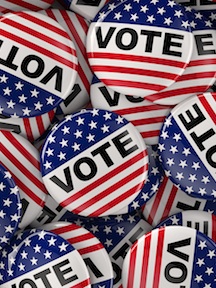By Connor Collins
Voting is a crucial part of any democracy, although one often taken for granted. The United Kingdom’s referendum to leave the European Union, known as the “Brexit,” is one of the latest in an historical succession when the power of the vote enacted change and impacted the world. Women’s suffrage, the Civil Rights Movement, and the Voting Rights Act of 1965 all reaffirmed the power of the vote and peoples’ desire for it in the United States. But not every vote is as glamorous or impactful as the UK’s Brexit referendum or a presidential election. Failure to make national headlines or elect a new president does not detract from the importance of voting because voting is about exercising a civil responsibility. To vote is to be an engaged citizen, to at some point have thought about an issue or a candidate and have made a decision.
Education has been a traditional avenue for exploring and expanding one’s civic duty. But if that is true, why is college voter turnout so low? During the 2012 presidential elections, only 45% of surveyed college students voted, according to the Institute for Democracy and Higher Education’s National Study of Learning, Voting, and Engagement (NSLVE) at Tufts University. However, this study found that voting rates varied, sometimes dramatically, by major. Of the 7.4 million students whose records were obtained for the 2012 presidential race, 55% of education majors voted, representing the highest voting rate of any major. Humanities majors came in second place at 49%. Counterintuitively, political science majors landed in fifth place at 46%, although that number was compiled from the social sciences collectively. Engineering majors tied for last place with math and statistics majors, both with a voting rate of 35%. Technologies and technicians majors also fell into the bottom five with a voting rate of 40%. The New York Times provides a full list of the top and bottom five majors by voting rate.
Nancy Thomas, the director of the Institute for Democracy and Higher Education, explained for McClatchy DC one possible reason for the disparity between majors: “Voting is a matter of learning…We see disparities in learning as evidenced by these numbers.” Mike Burns, the national director of the Campus Vote Project, suggested in the same article that education majors vote at a relatively high rate because, for many, their futures as state-employeed educators depend more on policy outcomes.
The high voting rates of education, humanities, health science, and social science majors highlight the importance of a liberal arts and sciences education in the cultivation of well-rounded, informed citizens. The curricula of these majors challenge students to analyze information, to ask questions, and perhaps most importantly, to develop skills for life beyond the classroom. The major benefit of a liberal arts and sciences education has long been preparation for what comes next. The Phi Beta Kappa Society champions the liberal arts and sciences for the same reason. The results of the NSLVE study reflect the notion that the liberal arts and sciences contribute to the development of civic responsibility. The findings also show where policymakers, teacher, administrators, and education leaders can work to increase college voter participation. Thomas says that bringing more open discourse about the current political scene can increase social and civic awareness and raise voting rates. She recommends to Insider Higher Ed, “talk politics, and do it in the disciplines where you wouldn’t think to do it…Every discipline—every single one—has public relevance.” Encouraging political discourse across majors could help students realize the power of their votes and their social responsibility to exercise their freedom of thought in voting.
Connor Collins is a senior at Case Western Reserve University double majoring in political science and sociology. Case Western Reserve University is home to the Alpha of Ohio Chapter of Phi Beta Kappa.




